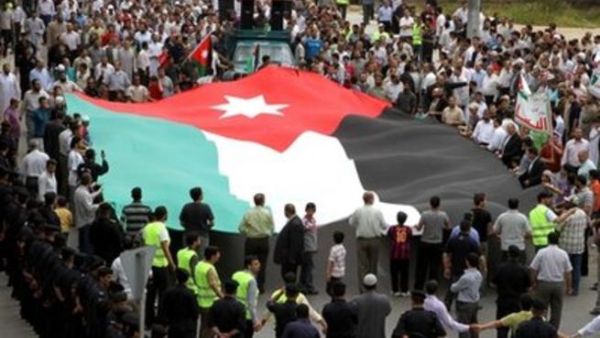Most national tickets competing for Wednesday’s [Jordanian] elections share almost the same plans to address Jordan’s economic and financial woes.
Advocating tax reforms, replacing guest workers with Jordanians, fighting corruption and imposing higher royalty fees on mining firms were the major issues representatives of national tickets, interviewed by The Jordan Times three days ahead of the polls, talked about.
Meanwhile, economic and political analyst Zayyan Zawaneh said national lists have not come up with “out of the box solutions” to address challenges facing the Kingdom over the next few years, noting that they lack the experts capable of drawing up plans for economic reform.
Sami Shreim, of the Jordanian Unified Front Party list, cited three main priorities to fill the fiscal gap in the state budget that aim to generate around JD1.3 billion, which is the same amount projected as a deficit in the government’s spending bill for 2013.
Shreim explained that merging and scrapping some independent government institutions could save the Treasury around JD500 million, while adopting a progressive tax system could generate another JD500 million and raising royalty fees on mining companies would pump over JD300 million into the Treasury.
His list, he said, believes in expanding and supporting small- and medium-sized enterprises as well as implementing long-term strategic plans to create more jobs for Jordanians.
The National Current Party (NCP) list, headed by veteran MP Abdul Hadi Majali, will focus on seven issues to point the economy in the right direction, according to the party’s agenda posted on its website.
These pillars are poverty, unemployment, job creation, decentralisation, comprehensive development, equality in opportunities and addressing flaws in key sectors such as education, health, water and energy.
The party seeks to change the economic approach followed by authorities since 1980, which relies heavily on foreign grants and remittances as major income sources for the country.
The party’s candidates believe it is no longer acceptable to depend on the finance, telecommunications and transport sectors as major job-creating businesses, pledging to boost the agriculture sector, which, according to NCP figures, employs around 15 per cent of the population.
The NCP agenda also includes narrowing the deficit in the state budget to normal levels in four years, in addition to reviewing laws governing state finances and investment and enhancing the Kingdom’s business and economic competitiveness.
The party calls for adopting a progressive tax regime as a way to generate higher public revenues.
Zaid Majali, who heads the Justice and Development list, also mentioned adopting a progressive tax system and taxing the rich as a priority to boost the state’s revenues and achieve social justice.
Majali noted that as there are around 400,000 guest workers in the Kingdom, the list would work on replacing them with Jordanians.
Asked if it would be an easy task to implement such a move, he replied that increasing awareness and erasing the culture of shame among job seekers could help convince young Jordanians to accept jobs held by foreigners.
However, Majali admitted that solving Jordan’s economic problems could take more than five years, saying the list would also focus on sending the corrupt to court.
Salem Dheifallah, from the Construction national ticket, talked about a list of proposals to revive the economy and improve state finances.
Among the suggestions, Dheifallah said, the list intends to call for recovering public funds “stolen by corrupt officials”, by bringing all suspects to justice.
Privatised companies that failed to achieve the set development goals should be returned to state ownership, he added, indicating that the list’s agenda also includes replacing guest workers with Jordanians and imposing higher residency fees on these workers in a bid to stem the transfer of foreign currency out of the country.
Not applying a progressive tax system is in violation of the Constitution, Dheifallah said, adding that imposing higher taxes on banks and large firms is also a “must”.
Extracting untapped natural resources is another priority for the list, which will work on reviewing royalty fees granted to phosphate and potash firms, he noted.
Dheifallah added that taxes paid by Jordanians should be reflected in better public services, particularly free education and medical treatment.
Cancelling and merging independent public institutions is also on the ticket’s agenda, as well as restructuring ministries in a bid to cut spending.
The list even calls for restructuring the Royal Court, according to Dheifallah, who claimed that it has over 3,000 employees, a figure he described as too large.
The Change list agenda is almost the same as the others.
Its representative, Samer Mahasneh, said the bloc would work on covering current expenditure in the state budget through local revenues, while depending on foreign and Arab grants for capital spending.
Asked if he believes whether the country should continue to rely on donors to implement development projects, Mahasneh noted that Jordan has secured $5 billion in grants for the next five years from Gulf countries.
Zawaneh said lists talk about generalities and have not come up with concrete solutions to address challenges facing the Kingdom over the next few years.
The analyst criticised the fact that 61 national lists are running for 27 seats in the Lower House, saying the Elections Law should have restricted these seats for political parties.
Most of the lists, he said, are based on alliances between people and not on economic or political programmes.
Only political parties can come up with a comprehensive vision to improve political and economic life in the country, Zawaneh noted.
“Unfortunately most of the lists lack the capabilities and competent experts who could prepare real reform programmes.”








